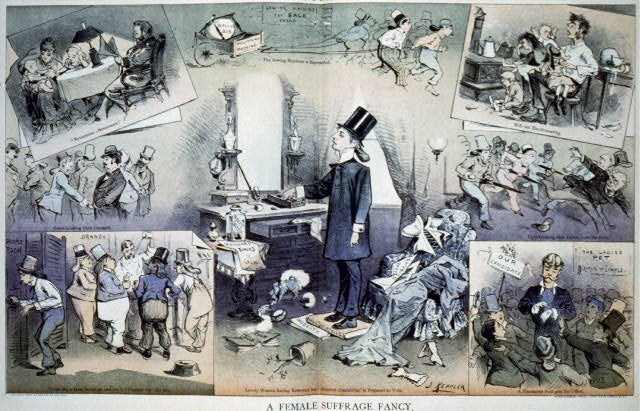What was life like for women and girls?
Women and girls were raised to take care of their household. They were considered too weak, lacking in intelligence, and not serious enough to understand business and politics. It was believed that women were incapable of even handling their own money and estates. Women were treated as the weaker sex, only capable of being good housewives and taking care of children.
Women could not enjoy some of the rights men did. For example, they could not own property, and did not have any claim to the money they earned, they could not vote, and they were under the control of either their father or husband. They were expected to focus on housework and their children, not politics.

Composite of eight caricatures showing women dressing and interacting in society as men; drinking; voting for handsome candidates; driving ugly men from the polls; and a domestic scene showing a man taking care of children.
The following are quotes explaining women's place in society pre-suffrage:
"So why weren't women allowed to vote? It's sad to say, but throughout history, in the United Kingdom, the United States, and many other place around the world, women and girls were considered weak and even silly, able only to bring up children and be good housewives," says David Roberts, author of Suffragette: The Battle for Equality.
David Roberts goes on to say that "if a woman got married, she had to promise to "obey" her husband in marriage vows, but a man never had to promise to obey his wife. A married woman gave up what few rights she had when she was single: he husband "owned" her. He also owned all her wealth and property. Even if the home they lived in had belonged to her before her marriage, her husband could throw her out on the street without a penny if he wanted to divorce her. She, on the other had, could not even divorce him without his agreement."
In the Declaration of Sentiments, Elizabeth Cady Stanton states that "he has made her, if married, in the eye of the law, civilly dead."
Dr. Graham Warder's article "Women in 19th Century America" says that "in colonial America, men were considered superior to woman –- in all ways, even in terms of morality. In a world of strict patriarchal hierarchy, men controlled not only wealth and political power but also how their children were raised, religious questions, and all matters of right and wrong." During this time, it was beleived that men and women's interests with work and daily living were very different. Dr. Graham Warder writes that "the doctrine of “separate spheres” maintained that woman’s sphere was the world of privacy, family, and morality while man’s sphere was the public world -– economic striving, political maneuvering, and social competition." He goes on to quote Catherine Beecher as saying in her "Treatise on Domestic Economy", “in civil and political affairs, American women take no interest or concern, except so far as they sympathize with their family and personal friends; but in all cases, in which they do feel a concern, their opinions and feelings have a consideration, equal, or even superior, to that of the other sex. In matters pertaining to the education of their children, in the selection and support of a clergyman, in all benevolent enterprises, and in all questions relating to morals or manners, they have a superior influence.”'